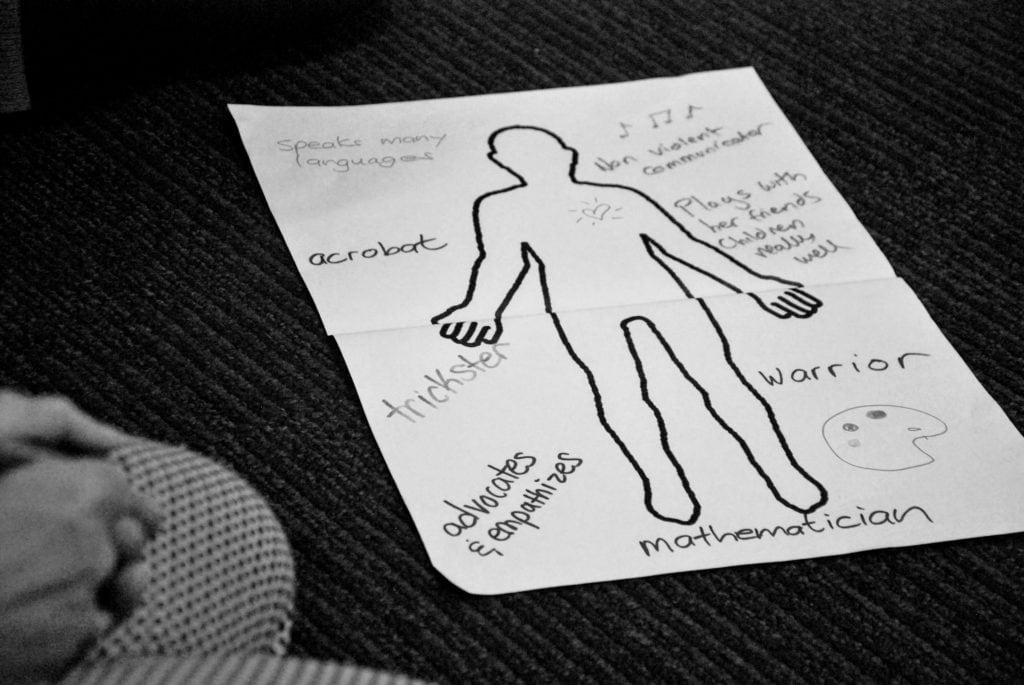Delegates at the 9th International Drama in Education Research Institute were treated to an abundance of exciting and engaging practical workshops during the 7-day event. To give you a flavour of what was on offer, the Dialogue team have put together a series of toolkits that include the workshop abstracts, biographies of the workshop leaders, and featured activities. It’s important to note that these activities are by no means comprehensive of the overall workshops but merely represent a small portion of the activities being introduced to participants.
Bridging the tyrannical distance of disadvantage: Process drama for adults in South Western Sydney
Facilitated by Rachael Jacobs (Australia) and Zoe Hogan (Australia)
“The benefits of using drama to develop literacy have been well established, but adults with disadvantage face several barriers to engaging in drama learning processes. This distance was evident in a program piloted by Sydney Theatre Company, Western Sydney University and the University of Sydney. The program was conducted in across Sydney, in several low socioeconomic areas, with classes comprising refugees, migrants and English speakers, using process drama tools to improve literacy. Folktales were collaboratively developed with participants to facilitate a humanising curriculum based in the imaginative realm. This workshop provides an example of the approach, engaging participants in a process drama based on one of the folk tales to demonstrate the techniques used. The political and social dimensions that led to the success of various strategies and the limitations of others will be discussed. The project fostered creative ways of being and bridged racial and cultural distances among participants. This workshop also explores the challenges encountered by adults with disadvantage in creative spaces, and possibilities for imaginative pedagogies in their learning environments.”
Rachael Jacobs is a lecturer in Creative Arts Education at Western Sydney University, current Director of Research for Drama Australia, a community activist and freelance writer. Rachael’s areas of research include assessment, embodied learning and creativity. Rachael conducts arts research projects situated in refugee communities. She is the organiser of the community group, Teachers for Refugees, and runs an intercultural dance company.
Zoe Hogan is a Teaching Artist and playwright. As a Teaching Artist, Zoe has worked at Sydney Theatre Company, Starlight Children’s Foundation, Sydney Story Factory, Refugee Council (UK) and Mind the Gap (UK). Zoe holds a MA in Theatre and Global Development from University of Leeds (Charles Barber Prize, Bonamy Dobrée scholarship). Plays include Greater Sunrise (25A, Ensemble Theatre), The Return (Starlight Children’s Foundation), All the Happy Things (PopUp Theatrics, Buenos Aires Youth Biennale) and Small Life (Women Playwrights International Conference, Playwriting Australia’s National Play Festival).
Featured Activities:
- Begin by picking a central theme that you would like to explore in the text/story
- For example, Hogan wrote the word “Power” on the whiteboard. She invited participants to write this word in their mother tongue or in another language they knew
- When a participant wrote the word in their language they were also asked to say it out loud before sitting down again
- Hogan then pointed to words on the board – the person who had written it in their own language would say it out loud and the whole group would repeat it back together
- Hogan then asked participants to embody the idea of power – someone would say the word, in any language, and accompany it a movement
- Everyone would repeat the word out loud along with the accompanying movement
“This [activity] evolved initially because, when working with different levels of English in the room, we wanted to make sure our participants could access this central concept of the story that we were explaining in that workshop. So, it came out as quite a practical need to ensure that everyone was on the same page even if it was just about this concept […] I think from a philosophical point of view we’re always trying to find moments in a workshop where our participants can be our teachers. Sometimes we pronounce things terribly and they laugh at us […] we’re trying to bring the divide of learners and teachers and participants” – Hogan
Activity 2
- This activity was predicated on Process Drama – and its focus was on the mythology/story of Pandora’s Box
- In this section on the workshop, Jacobs read out a section of the story:
“…Pandora told the brothers, “I will marry one of you. Who can show me they can be the better husband?” Pandora chose the gentle brother. They were married and were very happy. The powerful brother was angry. He sent a wedding present to Pandora and his brother. It was a box labelled ‘Do not open.’ Pandora was curious about the box. One day she picked it up and shook it. It felt empty. She put her ear to the box. She gasped. She could hear…”
- Jacobs asked the participants to suggest some things Pandora might hear e.g. laugher, insects buzzing, magical singing, her own voice, ticking etc.
- Split into groups of 4/5, participants were asked to choose three sounds. They were allowed to think mythically, humorously, whatever they liked
- The participants were asked to record 10 seconds of each of the three sounds on their phone
- Once everyone had recorded their sounds, they came back into the room and sat in a circle
- Jacobs placed a chair in the middle with Pandora’s Box on top.
- She invited participants to volunteer to sit on the chair, pick up the box, and shake it (like Pandora did in the story).
- When the participants followed these instructions, Jacobs played some of the recorded sounds from the various phones and the participants in the centre were asked to react the sounds played
